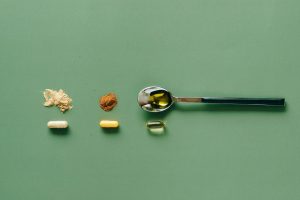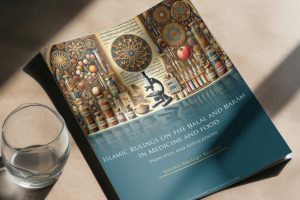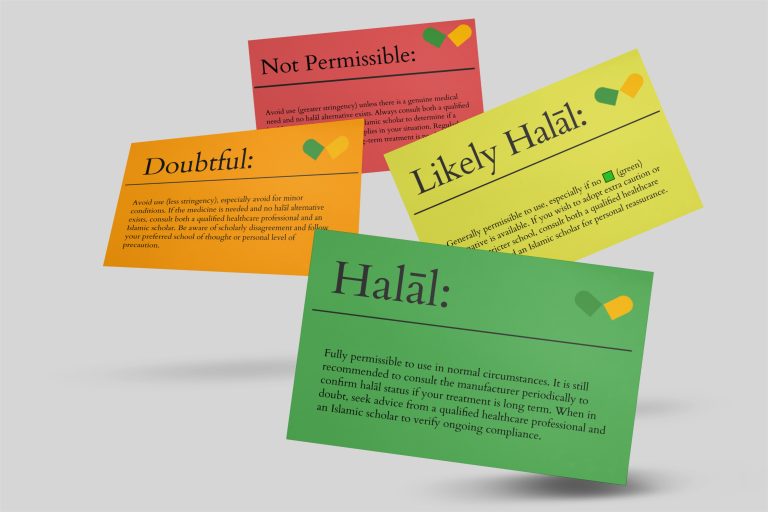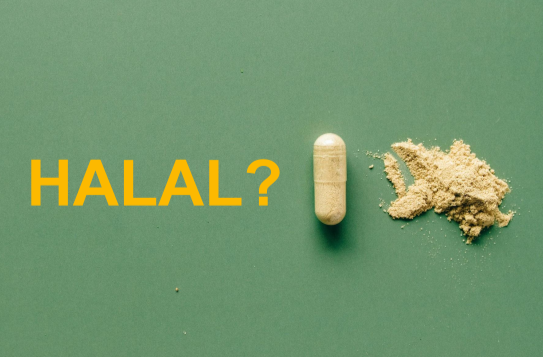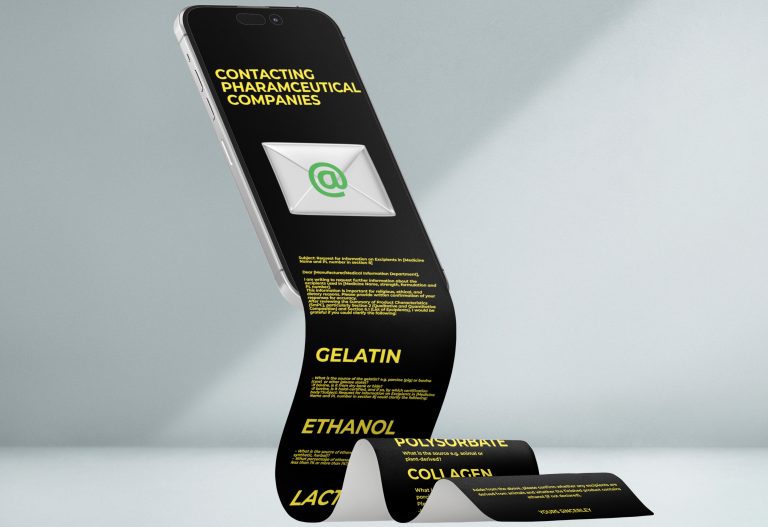What to do if a medicine contains harām ingredients and/or excipients
This information resource can help guide you on what steps you may want to take if you find out that a medicine contains harām (prohibited) ingredients an/or excipients. It includes the conditions of when it is acceptable to take/use a medicine that contains harām ingredients and/or excipients, is derived from harām sources, or where there is cross-contamination with harām sources. It can also support discussions between individuals and healthcare professionals (HCPs) to help make informed decisions on the next steps and includes the reasons why HCPs may not be able to prescribe/supply a halāl alternative.
This resource is for the Muslim community (including patients, carers, parents and members of the public). All HCPs, their teams and anyone involved in delivering care and support (across all care settings), may also find it useful when supporting Muslim individuals with gathering and understanding information about their medicine(s).
To find out how to check if your medicine contains harām ingredients and/or excipients, see our resource on ‘How to find out if a medicine contains harām ingredients and/or excipients‘.
Three steps to take if your medicine contains harām ingredients and/or excipients
Click on steps 1-3 below to help you find out more about your medicine and its permissibility:
- Step 1: Check if you meet all five of the conditions that make the harām medicine permissible to take/use
- Step 2: Seek a halāl alternative (where needed and available)
- Step 3: Arrange an appointment to speak with the HCP who prescribed/supplied your medicine
Step one: Check if you meet all five of the conditions that make the harām medicine permissible to take/use
It is important to remember that even if a medicine contains a harām ingredient and/or excipient, it does not always mean it is prohibited to take/use.
There are five conditions that must be met to make the harām medicine permissible to take/use. Find out if you meet the five conditions here.
✅If all five conditions are met → it is permissible to take/use the medicine even if it contains a harām ingredient and/or excipient.
⚠️If all five conditions are not met → it may not be permissible to take/use the medicine and you should go to step 2.
Step two: Seek a halāl alternative (where needed and available)
If all of the five conditions are not met in step 1, it is advisable to seek halāl alternatives (where available and possible). Doing this may help support your discussion with your healthcare professional, mentioned in step 3.
You could find out about possible halāl alternatives in the following ways:
- Look for different formulations e.g. look for halāl liquid formulations where you have been prescribed/supplied capsules made from harām gelatin sources.
Your local pharmacist, who is an expert in medicines, may also be able to help you find halāl alternatives. You could speak to a pharmacist working in the following areas:
- The community pharmacy – where you get your regular medicines dispensed as they have access to your medication records
- The local hospital – if you received your medicines from the hospital pharmacy
- The GP practice – some surgeries have a practice-based pharmacist available that you can make an appointment with.
HCPs, such as pharmacists, may find the Specialist Pharmacy Service (SPS) resource on ‘Searching for presence or absence of an excipient in medicines‘ useful to help find alternative halāl medicines that don’t contain certain ingredients or excipients. Further information can be found on the SPS website
If you are able to find an available halāl alternative, make a note of the medicine’s name, form and strength and the manufacturer’s name → go to step 3.
If you are not able to find a halāl alternative and all five conditions are not met → see the section on ‘Hardship begets facility’.
If you are not able to find halāl alternatives, but you later discover there are, then follow steps 1-3 again to assess your current situation.
Step three: Arrange an appointment to speak with the healthcare professional who prescribed/supplied your medicine
Healthcare professionals that may have prescribed/supplied your medicine include: your doctor, dentist, nurse, midwife, optometrist, pharmacist, physiotherapist, podiatrist, radiographer, paramedic or dietitian.
You may want to make an appointment with the healthcare professional who prescribed/supplied your medicine to discuss the following:
- If you want to discuss your current condition and treatment
- If you want to discuss changing to an alternative halāl option that you have found e.g. a halāl liquid formulation of the same medicine
- If you want to understand the reasons why you may not be prescribed/supplied an alternative halāl medicine – see section on Limitations on prescribing an alternative halāl medicine
- If you require further details to help you decide if the five conditions have been met e.g. you want to know if your medicine has been prescribed/supplied in line with current clinical guidelines and shows evidence of effectiveness
- If any of the five conditions change for you – e.g. a halāl alternative medicine now becomes available.
You may find it helpful to write down any questions you have for your HCP and to note down the brand/manufacturer, name, form and strength of the medicine you have found that is a halāl alternative.
However, it is important to know that just because you have found a halāl alternative it does not mean that it can be prescribed/supplied. There may be limitations on prescribing a halāl alternative. For further information, see the section on ‘Limitations on prescribing an alternative halāl medicine‘.
Limitations on prescribing an alternative halāl medicine
Sometimes your HCP may not be able to prescribe/supply an alternative halāl medicine. Here are some reasons why:
The medicine is not cost effective
Cost effective prescribing means the medicine prescribed needs to be safe for people, meet their clinical needs and ensure best value for money from NHS resources. The alternative halāl medicine may not be a cost-effective option.
The medicine is not readily available locally
You may want to contact your local pharmacy before approaching your HCP to find out if the alternative halāl medicine is readily available and if there are any stock issues. The alternative halāl medicine may not be readily available.
The medicine is not on the formulary
Formularies are a list of preferred medicines for clinical conditions that your HCP must use in their work setting, based on clinical effectiveness, cost-effectiveness and patient safety. The alternative halāl medicine may not be in the formulary.
There is a risk of antibiotic resistance
Your HCP may prescribe/supply a certain antibiotic over another to avoid antibiotic resistance and because it may also be the most clinically effective one to treat your condition. The alternative halāl medicine may not be the most clinically effective one to treat your condition.
You may wish to write down any questions and discuss these limitations (if relevant and appropriate) with your pharmacist or HCP who prescribed/supplied your medicine.
If your HCP cannot prescribe/supply an alternative halāl medicine, see the section on ‘Hardship begets facility’.
Hardship begets facility
From an Islamic perspective, if you have tried your best to seek an alternative halāl medicine and it becomes too difficult for you, then you can apply the principle of ‘hardship begets facility’ (al-mashaqqa tajlib at-taysir) which allows you to take/use the medicine you have been prescribed/supplied. This principle also applies to HCPs who prescribe/supply medicines.
‘Hardship begets facility’ simply means that if applying religious practice becomes too burdensome or creates hardship, then leniency can be applied to ease it. Allah Almighty says in the Qurān:
“Allah intends ease for you, not hardship” (Surah Al-Baqarah 2:185).
If you are still unsure if a medicine is permissible to take/use, then speak to your local practising Muslim HCP such as your local pharmacist or doctor, or your local Imam or trusted Islamic scholar (ideally who has relevant knowledge and expertise in the Fiqh of medicines).
Practical considerations for healthcare professionals
For HCPs and anyone involved in delivering care and support, it is important to:
- Understand which ingredients and/or excipients in medicines may be a concern for practising Muslims and why. For further information, see our resources under ‘Ingredients and excipients in medicines‘
- Have open discussions with individuals about their personal values or beliefs that may relate to their care and support where possible – e.g. some individuals may wish to avoid certain ingredients/excipients in medicines due to religious beliefs, others may not be as practising or have the same beliefs, so it is important to ask
- Discuss ideas, concerns and expectations – e.g. during consultations, you may be asked to help individuals to understand whether certain ingredients/excipients are present in their medicine(s), its source, and whether it is likely to be considered permissible in Islam/suitable for a halāl diet
- To find out how to check if a medicine contains harām ingredients and/or excipients, see our resource on ‘How to find out if a medicine contains harām ingredients and/or excipients‘
- For further information on the conditions of when it is acceptable for a practising Muslim individual to take/use a medicine that contains harām ingredients and/or excipients, is derived from harām sources, or where there is cross-contamination with harām sources, see the section on ‘Three steps to take if your medicine contains harām ingredients and/or excipients‘.
- Respect and support individuals in making informed decisions about their treatment
- Understand that you may be asked to explore alternative formulations that meet the individual’s religious requirements (where available), alternative pharmaceutical companies that make the medicine without a particular excipient/ingredient (where possible), or alternative treatment options for the condition (where clinically appropriate)
- HCPs may find the Specialist Pharmacy Service (SPS) resource on ‘Searching for presence or absence of an excipient in medicines‘ useful to help find alternative halāl medicines that don’t contain certain ingredients or excipients. For further information, see the SPS website
- There may be situations where you cannot prescribe/supply an alternative halāl medicine which you may need to explain to the individual. For further information, see our resource on ‘What to do if a medicine contains harām ingredients and/or excipients’, under the sections on ‘Hardship begets facility’ and ‘Limitations on prescribing an alternative halāl medicine‘.



